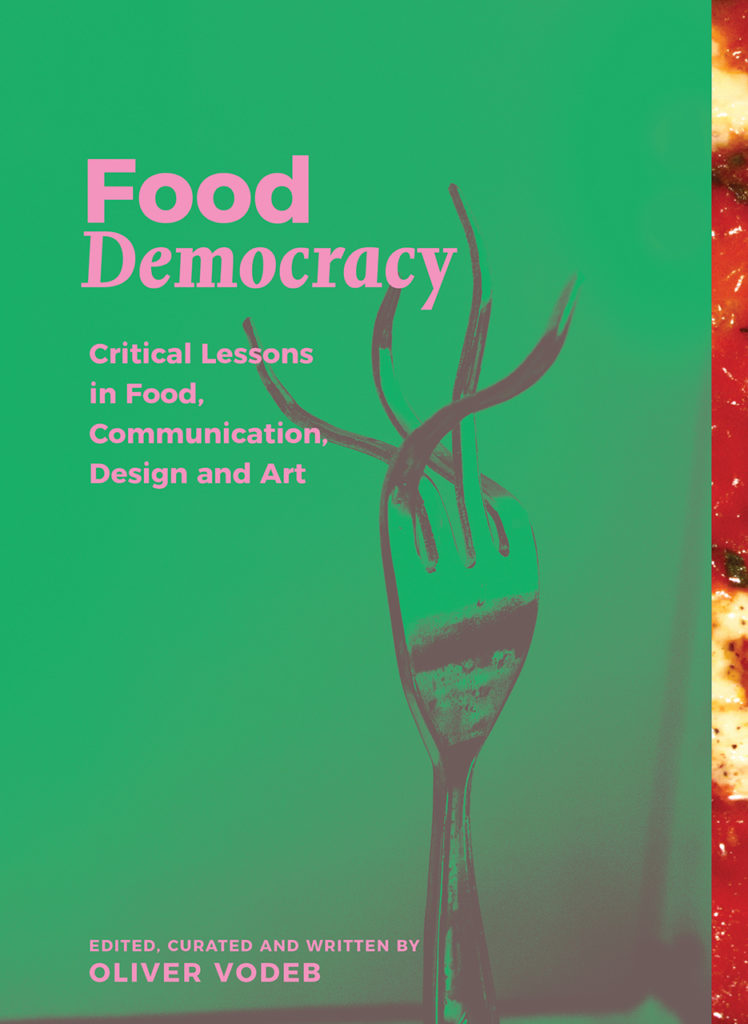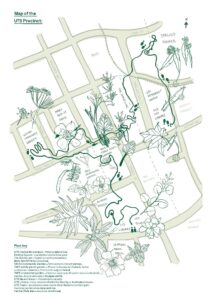
Food Democracy is a unique book in its direct approach to the politics of food and its commitment to creative practice as an avenue for social change. It deals with an increasingly important issue that is central to most global political struggles of the present and future. If you need to quickly catch up on why it is important, Alana Mann, offers a great summary of Food Democracy as a political project in this article.
Strategies and tactics of food democracy go well beyond growing tomatoes in your balcony. Localised food systems are important, as we have written about here, here and here, but are not necessarily immediately helpful to the one billion people most affected by poverty and hunger. Where to start thinking about this and designing better?
Considering food as a material, a system, a pleasure, and a right, this book asks how to make socially responsive communication, design and art that counters the role of the food industry as a machine of consumption.
In his introduction, author Oliver Vodeb writes of the making of ‘Food Democracy’ as an extradisciplinary research process. By this he means that research is also an institutional critique that ‘operates at the intersection of art/theory/activism (p18)’. A designer himself, among his many projects, Vodeb facilitates and designs Memefest, a blog, festival and collective of trouble makers based in Slovenia and Australia. The way this book is put together is based on the Memefest approach, which seems to me a kind of triage of work most relevant to the political project of Food Democracy rather than a competition over trends and fads. This is also the approach in section of the book dedicated to submissions to the Food Democracy themed ‘Friendly Competition’ in 2013. It is great to see these works in print, ans also to read the comments of the editors and curators, many of whom are designers.
As an academic reader I found the lack of an index or collated references slightly frustrating. I occasionally got lost and had some trouble finding my way out. But this is more a symptom of the topic than the design. After all, there is no end to what we need to read and learn if we commit to sharing food resources at a global scale. Also, the focus of this book is less on the discourse and more on the action. It presents food democracy as the responsibility of designers, communicators, artists and every other person with the skills to critique the global food industry. It makes food democracy the responsibility of the reader. What it does beautifully is present an array of inspiring food democracy projects. This provides an incredibly useful resource, and will ensure that this book is used in classrooms as a teaching and research tool.
The beautifully-designed, full color book includes many voices, both familiar and new, as well as a compilation of socially engaged recipes by the contributors. Special recipes for Burek the Great, Sardinian Magic, Crocodile Skewers, Slovenian Potica, and Catalan Calçotada. As I dipped in and out, something that struck me about the diversity of recipes and texts was the urgency of the politics coupled with the slow thinking that is necessary in this debate. In their beautiful essay on the Making Time project, Abby Mellick Lopes and Tessa Zettel unpack the fridge and the concept of ontological design, philosophising on what is really needed for being in the world together. Sam Burch also articulates beautifully the immense tension between urgent political action and slow time in his chapter ‘Everything has a story’ by pointing to the current health crisis affecting Aboriginal and Torres Strait Islanders and the personal and collective process of decolonization.
By examining the stories of the most basic level of human existence – namely food and country – a prism is created via which people may understand themselves as part of a greater story, and of a wider network of relationships. Sam Burch (p161)
Food Democracy is only AUD40, which is a steal in the cut throat world of academic publishing. It is really worth having on your shelf and in your library. It is an impressive and inspiring call to action in the kitchen, on the streets, and in our institutions.
Mann, A., 2014. Global activism in food politics: power shift. Springer.







0 Comments